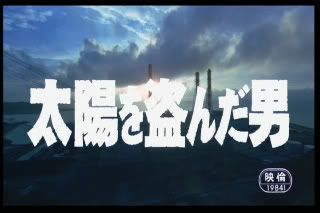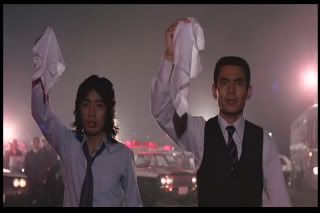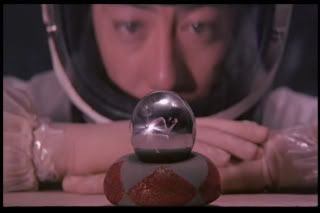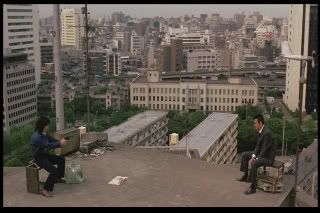
It starts--like more than a few Japanese films--with images of a mushroom cloud, a sight which I can only imagine is even more terrifying in Japan.
Makato Kido (Kenji Sawada) wants the police to call him “Nine,” since he can now be added to the list of eight nations who own nuclear weapons. He becomes known as “Mr. A-bomb” instead, a figure who achieves folk-hero status by holding the government ransom, threatening to detonate his homemade a-bomb if they don’t submit to his demands. To the kids at school, he’s just “Bubblegum,” a science teacher who is barely more mature than them, and who spends most of his time sleeping in class.

Kido bores his students by teaching them about nuclear weaponry, rather than following the standard high school science text. Since they’ll never be tested on Kido’s lessons, the students tend to ignore him. And no wonder: Kido has almost no personality to speak of.
The teacher explains to his students that A-bombs are easy to make--you just need the plutonium. This is one of the strangest parts of the film: to get the plutonium necessary for his bomb, Kido breaks into a military installation (I think), which appears to be guarded by members of Devo. The action comes in a series of still frame images, portraying a suddenly James Bond-esque Kido getting his hands on the goods, all to some swell 70s music.

Once he constructs the bomb (which we get to see, at length, in a series of montages), Kido is free to make his demands. But what is it that this terrorist demands? For starters, Kido wants to watch baseball games until the end--the TV stations always cut out after the seventh inning for the news. After that … well, he hadn’t thought that far. Enter “Zero” (Kimiko Ikegami), a local DJ who starts taking Kido’s calls on her new show. She suggests that “Mr. A-bomb” demand a Rolling Stones concert. He agrees with her and makes the demand, all to the chagrin of Detective Yamashita (Bunta Sugawara), a determined and heroic cop.
At this point, The Man Who Stole the Sun begins to look like a more run-of-the-mill cops and robbers story, except that the “good guy” is a science nerd with a nuclear weapon. The movie begins to engage in cat-and-mouse stuff, with car chases and the lot, and Kido having to be one step faster than the police. He never seems entirely aware of the severity of what’s going on--does he really have the guts to detonate the bomb? Or is it all just bluff? Kido seems more interested in constructing the bomb just to prove that he can; the power it grants him is almost an afterthought.

Added to the cops and robbers plot is a budding romance between Kido and Zero. The disc jockey is obviously attracted to the mystique around Kido, and the element of danger involved in being with a criminal. Typical to the 70s (at least in North America), Zero has bought fully into the “us against them” attitude, considering those people who are over thirty, or in authority, as evil. Still, she’s a fairly shallow character, whose real motivation is never really felt by the audience.
Oddly enough, The Man Who Stole the Sun was written by Leonard Schrader, brother to writer/director Paul Schrader, with whom he wrote Taxi Driver. The Man Who Stole the Sun has more than a few similarities with that film--the outsider as protagonist, the dangerous loner lashing out against society in a random and homicidal fashion that still somehow encapsulates the irritation and rage of the everyday man.

More so than in Taxi Driver, it’s not always clear in The Man Who Stole the Sun that the audience should be taking everything they see at face value. How much is actually supposed to be the events as they happen, and how much is supposed to be in Kido’s head? Does Kido really dump plutonium into a full swimming pool, or is it just something that he dreams up? While Taxi Driver seems like the more cerebral film, The Man Who Stole the Sun leaves you questioning whether or not some bigger statement is being made.
Or perhaps its just uneven. The car chases and the final battle with Detective Yamashita seem more like something out of a 70s cop show than a challenging work of art. I’m tempted to assert that this is somehow a comment on film itself, that a cops and robbers movie will always devolve into cliché and convention. Or something.
Despite its uneven nature, and its longer-than-necessary running time (147 minutes), The Man Who Stole the Sun is an intriguing film, and well worth seeking out, if only for the oddness of seeing a Western plot and story told by Japanese filmmakers.










1 comment:
I don't think Leonard Schrader had any hand in writing Taxi Driver, although I can certainly see the parallels you draw between individual loners taking vengeance on the world around them. I did get the impression that there was some disconnection between Schrader's script and the film on screen, as if it was being interpreted, rather than followed.
I think you give the film a bit too much credit - it seemed to me that its descent into cliche is simply because it runs out of ideas. I think it tries to ape Western movies a little too much, and doesn't have enough confidence in its own ideas (Which is a shame, because they're good).
Anyway, good review!
Post a Comment